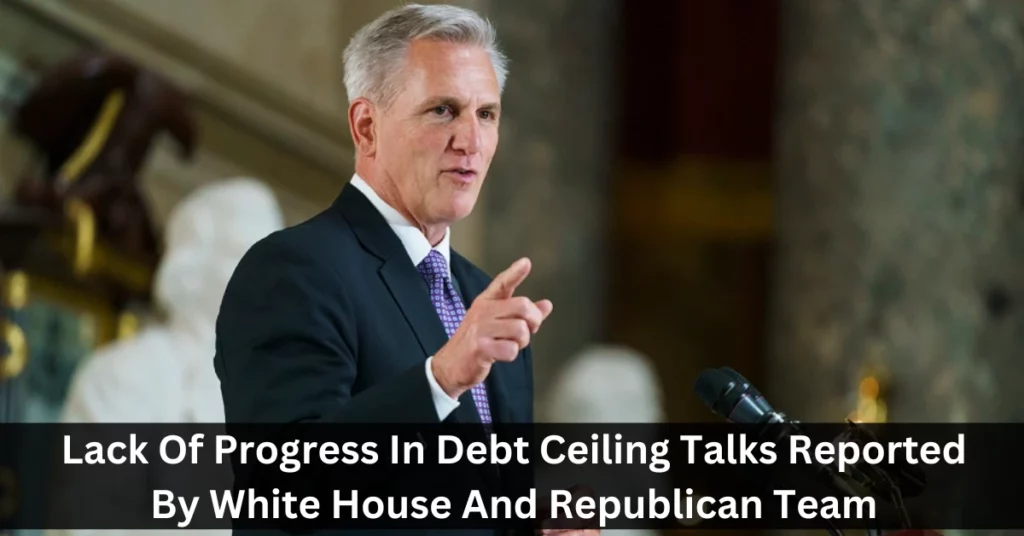AMERICA’S CAPITAL CITY, May 19 – The White House and Republican lawmakers met twice on Friday to discuss raising the federal government’s $31.4 trillion debt ceiling. Still, the meeting ended without any progress being reported or any future meetings being scheduled.
On the heels of a day of heated debate interrupted for many hours, the Treasury Department issued a dire warning that the federal government would be unable to meet all its financial obligations by June 1—invoking such a disastrous default scenario.
White House officials have stated they are still at “serious differences” with House Republican leaders, but Vice President Joe Biden has expressed optimism that a default can be avoided.
“I still believe we’ll be able to avoid a default and we’ll get something decent done,” While in Hiroshima, Japan for a summit of the Group of Seven wealthy nations’ heads of state, Biden spoke to the press.
The Republican Party has stated that it will not support raising the debt ceiling unless significant cuts in government spending are also agreed upon.
“There continues to be real … differences between the parties on these issues,” In an earlier press briefing, White House spokesman Karine Jean-Pierre also addressed the issue of Hiroshima.
The leading Republican in the discussions said on Friday that no progress had been made.
“We had a very, very candid discussion talking about where we are, talking about where things need to be,” Rep. Garret Graves, a Republican, told reporters after a second brief discussion with White House officials in the Capitol.
“This wasn’t a negotiation tonight,” Graves claimed the next meeting was unscheduled.
He agreed with House Speaker Kevin McCarthy that the “trajectory” of U.S. deficit spending and mounting debt must be changed.
“We have to spend less than the year before,” says McCarthy.
You can check out the tweet we have mentioned below confirming the Debt ceiling negotiations resumed after Republicans temporarily paused talks with the White House, by the NBC News-
JUST IN: Debt ceiling negotiations resume after Republicans temporarily paused talks with the White House. https://t.co/QQRuXxV8dX
— NBC News (@NBCNews) May 19, 2023
The negotiations overshadowed Biden’s Japan meeting with international powers.
Representative Patrick McHenry, a second Republican negotiator, said he wasn’t sure the two sides could meet McCarthy’s goal of achieving a compromise this weekend that could be presented to Congress for passage in the coming days.
Senior White House adviser Steve Ricchetti departed the meeting room assuring reporters he was “not assessing” the conversations.
McCarthy told reporters early Friday that the White House had made no “movement” toward Republican objectives.
After negotiations stagnated, U.S. stocks closed weakly.
Continue reading the more news articles we have provided the down below.
- Fatal Shooting Claims 3 Lives Leaves Others Wounded!
- DOJ Watchdog: Massachusetts U.S. Attorney Leaked Information, Lied To Investigators
- New York Limo Service Manager Found Guilty Of Manslaughter In Tragic Crash Claiming 20 Lives
Republicans want deep expenditure cutbacks in exchange for a rise in the government’s self-imposed borrowing limit, which is needed regularly to pay for spending and tax cuts legislators approved.
An agreement that can pass both chambers is tough to reach because Republicans control the House by 222-213 and Biden’s Democrats have a 51-49 Senate majority.
Republicans want spending to return to 2022, while Democrats want to maintain this year’s levels. Last month’s House bill would eliminate 8% of government spending next year.
A Youtube video from CBS News has said What Republicans and the White House are saying about debt ceiling Talks pause. Read below.
Republicans have pledged to protect military and veterans programs under that plan. Top Republicans agree with Democrats that that would eliminate domestic programs like education and law enforcement by at least 22%.
Republicans have blasted Biden for traveling to Japan during crucial negotiations.
The White House demanded a “clean” debt ceiling rise without conditions, stalemating Biden and McCarthy for much of the year. Republicans only supported a spending-cutting pact.
Shalanda Young, OMB director, and Ricchetti represented the White House in two-way conversations. Graves and McHenry represented McCarthy.
Republicans are hardline. The House Freedom Caucus pushed the Senate to vote on a previously enacted House package to lift the cap until March in exchange for 10 years of deep expenditure cuts on Thursday.
House and Senate Democrats are concerned about new job requirements for low-income government aid programs.
In 2011, a Democratic president, Senate, and House came close to default.
Congress avoided default, but the economy suffered from the first-ever downgrading of the US’ top-tier credit rating and a significant stock sell-off.

